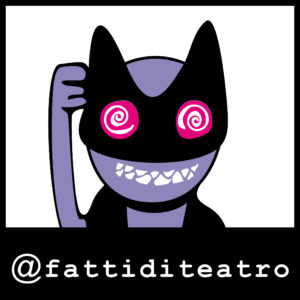The hard way of the Everyman
At PerformAzioni 2018 The Ritual is on stage, result of twelve years of research by Instabili Vaganti between impossible definitions and performance art.
Once upon a time there was theatre. Period.
Then, the time came for definitions. Contemporary, bourgeois, of research, commercial and the last one – the one which is currently up-to-date – of ‘teatro popolare d’arte’ (popular theatre of arts). The most contradictory and least convincing, inasmuch as the arts, if innovative and original, like windows open to new horizons, have always been ahead of their times. Therefore, they became popular (more or less, but never national-popular) at least half a century after the death of their authors. From Fantozzi who ridiculed Battleship Potemkin, to Max’s brother in law who, in Rebecca by Hitchcock derided Picasso, the terms art and popular have never coincided with a common feeling. Hence, we will propose a simplification born when we watched The Ritual. There exists theatre. There exists non-theatre. If you attend a play and wake up the next day with a new idea, if you realize, maybe annoyed, that you are assailed by doubts, if you continue to feel an unexpected and disturbing emotion, it was theatre. Otherwise, if you remained resolute in your unwavering beliefs, if the wing of poetry has not even touched your shoulder, it was merely non-theatre. Last night, in Bologna, all it took was seeing the bright look, the infectious enthusiasm of the young performers who are participating in the international session under the guidance of Instabili Vaganti, to understand that it was theatre.
At this point, we should do an analysis of the elements of the performance to explain why this happened, what worked and to what extent. We could retrace, passing from the theory included in the book Stracci della Memoria (Rags of Memory) to the practice of The Ritual, a series of items that are significant in themselves, such as the perfect outcome of Nicola Pianzola’s spiry or essential movements that turn into sheer dance: from the radiant capoeira to tribal dances, gestures combine with sounds with magical harmony; the actions that fill completely a site-specific spatiality; the dialogue between Anna Dora Dorno’s voice and music and sounds by Riccardo Nanni (able to recreate the atmospheres of a rock opera with short spoken parts that resew actions and songs); the symbolic use of colours and objects that combine with images and costumes in order to create an exquisite example of performance art – where ethics and aesthetics meet in an original expressive language, in a multidisciplinarity free from summation reasons (for Fus’ purposes). However, we will not tell you that because, since we followed the creative process, you will accuse us of partiality.
Then, we will do something else, given that, with our readers, we always lay our cards on the table. We will describe to you a completely personal, partial, subjective experience.
From the darkness of a deconsecrated church, like in a morality play, the Everyman emerges, the common man who, with his medieval sackcloth, inevitably reminds us of the atmospheres of The Name of the Rose. However, this William of Baskerville who, with his lantern/knowledge wants to enlighten the human path, in the face of death has many doubts about what to take with him: he has not yet surrendered to his inescapable end. Long is the way and hard, that out of Hell leads up to light, out of the waste land where there “is no water but only rock / Rock and no water and the sandy road1”, to the romantically titanic challenge of the rebel angel: “Better to reign in Hell, than serve in Heaven2”. Prometheus’ rebellion is the masculine principle, forged in fire, made of flesh and blood.
However, it is the feminine principle that comes forth, virginal in her bridal gown, but already aware of the eternal recurrence, of the procreative/creative act excluded to men, of the seductive and reconciling womb of Mother Earth. And not even war, strength and arrogance, nor beauty and love, could ever exorcize the greatest human fear – the fear of the void, of the not-self, of the absence.
Nonetheless, in the end, Everyman will reconcile with the inevitable, with his wretched remains of an old man chanting his farewell, with the voice of the time lost forever; and so will we. Lady Death moves forwards and it is good to just let go, surrender to her arms and be cradled: “Lay your sleeping head, my love, / Human on my faithless arm; / Time and fevers burn away / Individual beauty from / Thoughtful children, and the grave / Proves the child ephemeral3”.
“1The Waste Land, T. S. Eliot
“2Paradise Lost, John Milton
“3Lullaby, W. H. Auden
Translation by Angela D’Ambrosio





